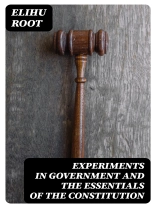In ‘Experiments in Government and the Essentials of the Constitution, ‘ Elihu Root presents a critical examination of the American political system, emphasizing the intricate balance between power and liberty foundational to the Constitution. Root’s analytical approach, enriched by a clear and eloquent literary style, delves into historical precedents and contemporary issues, offering a nuanced perspective on the evolving nature of governance. The book is situated in the early 20th-century discourse on democracy and reform, reflecting Root’s concerns about the challenges posed to constitutional integrity in a rapidly changing society. Elihu Root, a prominent lawyer and statesman in the United States, served as Secretary of War and later as Secretary of State, experiences that profoundly shaped his understanding of governmental structures and international relations. His esteemed career, including receiving the Nobel Peace Prize in 1912, provides a unique vantage point on the complexities of administration and policy-making, which informs his reflections in this work. Root’s deep commitment to democracy and his advocacy for institutional reform resonate throughout the text, making it a vital contribution to political thought. This book is a must-read for students of political science, law, and American history, as well as any reader seeking insight into the foundational principles of the U.S. Constitution. Root’s exploration of governmental experiments encourages critical reflection on contemporary democratic practices, making it both timely and timeless in its relevance to ongoing debates about governance and civil liberties.
Sobre el autor
Elihu Root (1845–1937) was a distinguished American lawyer and statesman, recognized primarily for his significant contribution to both domestic and international law and governance. During his illustrious career, he served as the United States Secretary of War under President Mc Kinley and President Theodore Roosevelt, later assuming the role of Secretary of State under President Roosevelt. His profound knowledge and expertise in legal matters earned him a Nobel Peace Prize in 1912. In his scholarly work, ‘Experiments in Government and the Essentials of the Constitution’ (1913), Root encapsulates his profound understanding of constitutional law and the American governmental framework. This book delves into the principles of governance and the fundamental elements that underpin constitutional democracy, reflecting his deep-rooted belief in the importance of legal order and stability for the well-being of the nation. Root was not just a political figure but an intellectual force; his legal acumen and advocacy for arbitration in international disputes showcased his forward-thinking approach to conflict resolution. His writing embodies a clear, analytical literary style marked by precise argumentation, and it serves as an instructional guide for understanding the intricate balance between government experimentation and adherence to constitutional foundations.












